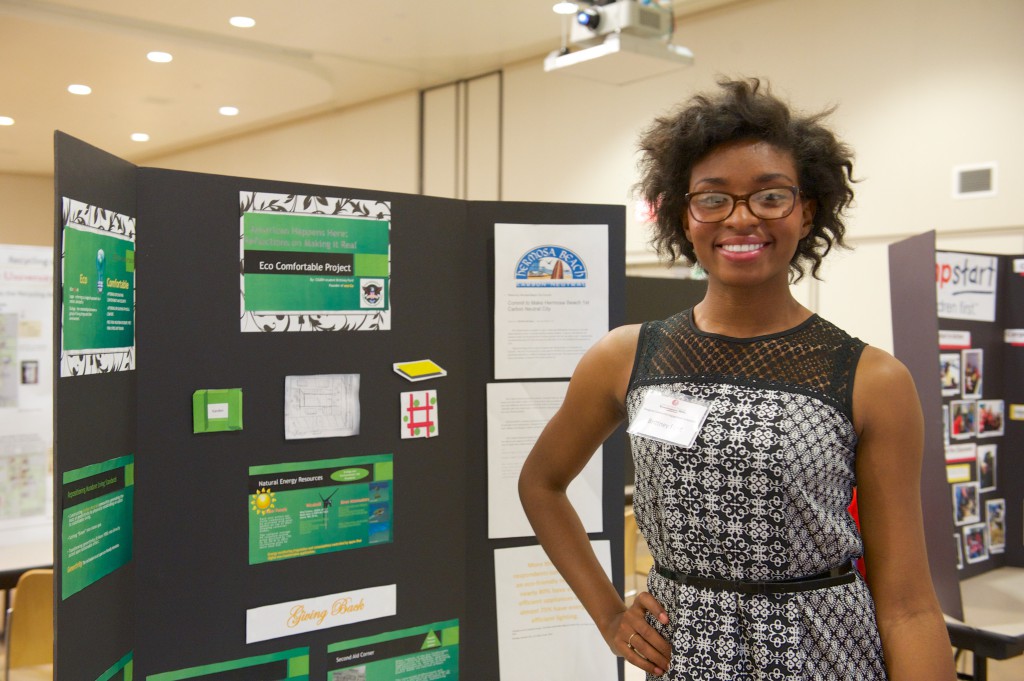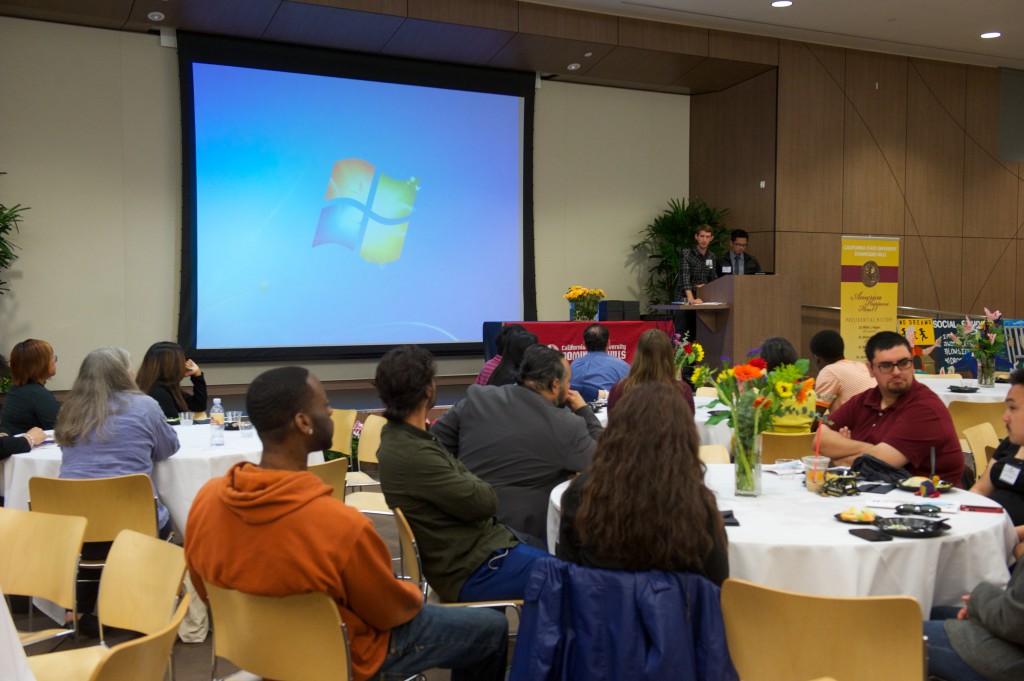
Have you ever wanted to live life more simply, maybe in a community where everyone grew their own produce in an organic garden, and then share and trade it with their neighbors, all while living in homes powered entirely by naturally derived energy sources?
Though it might sound impossible to achieve in our current society, it could soon be a reality according to California State University, Dominguez Hills (CSUDH) student Brittney Ford.
Along with a team of colleagues, Ford presented her version of a small community agricultural living quarters, called the Eco Comfortable Project, at the Inaugural Community Engagement Symposium on April 28 to a ballroom full of students, faculty and community members, including keynote speaker Luis Genaro-Garcia, who spoke about art spurring social activism and justice, and Los Angeles County Assistant Sheriff and City of Lakewood Mayor Todd Rogers (who also happens to be a proud CSUDH alumnus; Class of 1984, B.A. history).
“This university has always been bold about making a difference,” Rogers said. “The environment here is one of ‘be an activist for the change you want to see in the world,’ and I take that with me in everything I’ve done since I graduated here decades ago.”
The symposium featured nearly three dozen video, slide and poster presentations, including a plan to restore the environment at the Compton Creek, an initiative to engage more students in the science, technology, engineering and math (STEM) fields, partnerships to promote branding at the Carson Animal Shelter, and a plan to improve composting and recycling initiatives on campus.

Bringing together theory and real-world practicality to improve our community is something that Ford, a senior communications and media student, is deeply invested in.
“It’s a safe place for us as students to bring ideas to the community and show what we’re doing as their neighbors” Ford said of the symposium. “Our community gets to see the positive impact CSUDH students are making in people’s lives.”
Ford, founder and CEO of the Eco Comfortable Project, began implementing the idea of sustainable living as part of a service project for her Principles of Marketing class at CSU Dominguez Hills. Although she had thought of the idea before, the class gave her the resources to bring it to life.
The project aims to unite social entrepreneur investors to create what Ford calls “sustainable real estate development.” During the symposium, Ford and her team unveiled renderings of a carbon neutral community that showcased how agricultural communities of four would allow homeowners and renters to grow and manage their own organic gardens by using repurposed product such as coffee grounds to grow different produce, which they could then trade between themselves.
In their presentation, Ford and her team showed how each dwelling would utilize four truck containers, all of which would encompass a digitally tempered greenhouse in the center. The shipping containers would be stacked to create multiple story homes with stairs or possibly an eco-friendly elevator, otherwise known as an ‘Eco-vator.’
In an effort to be completely sustainable, the truck container homes are also intended to be powered entirely from naturally derived energy sources, such as the kinetic energy from rivers, solar panels and wind mills. Trade would be encouraged between the dwellings for edible goods or personally designed products, cutting down on waste. Each unit of four would also be equipped with a 3D printer that could make small household items, such as toothbrushes, combs and eating utensils.
Ford hopes to receive grants to build a pilot version of the dwellings here on campus at CSU Dominguez Hills. She says that UCLA’s Sustainable Technology and Policy Program has shown interest in the project, and she is currently looking for students and professionals in the fields of science, engineering, chemistry, art and architecture to help build the dwellings.
“We want to create prototypes and have students live in them to see what works and what doesn’t,” says Ford. “It’s a big idea, so getting real-world data will be crucial to seeing how it can expand.”
Professor of business administration Kirti Sawhney Celly, Ford’s faculty mentor, says that projects like the Eco Comfortable Project provide an invaluable learning experience.
“You become grounded in real work, and with projects like these, you get a chance to see real change while you’re working,” she said.
Mitch Maki, vice provost of academic affairs, took time at the symposium to reach out to Ford and all other presenters making a difference, saying, “Oftentimes, you will not be thanked for the incredible work you do. You may never know how you’re truly affecting people’s lives. In honor of that, I want to thank you for your service. You all make a difference.”
In addition, Cheryl McKnight, director for Service Learning and Civic Engagement and David Gamboa, CSU Dominguez Hills’ director of government and community relations, presented Community Partner awards to Habitat for Humanity, the L.A. Galaxy, Dominguez Rancho Adobe Museum, and the West Basin Water Municipal District for their engagement efforts with CSU Dominguez Hills’ students, faculty and staff.
McKnight said that projects like the ones shown during the symposium are not just vital learning opportunities, but crucial to making a real difference in our communities.
“Service learning is the queen of high-impact practices,” she said. “The projects you see at the symposium are examples of how students can take what they learn in the classroom and apply it to improve people’s lives.”
To find out more about all other projects presented at the symposium, click here.